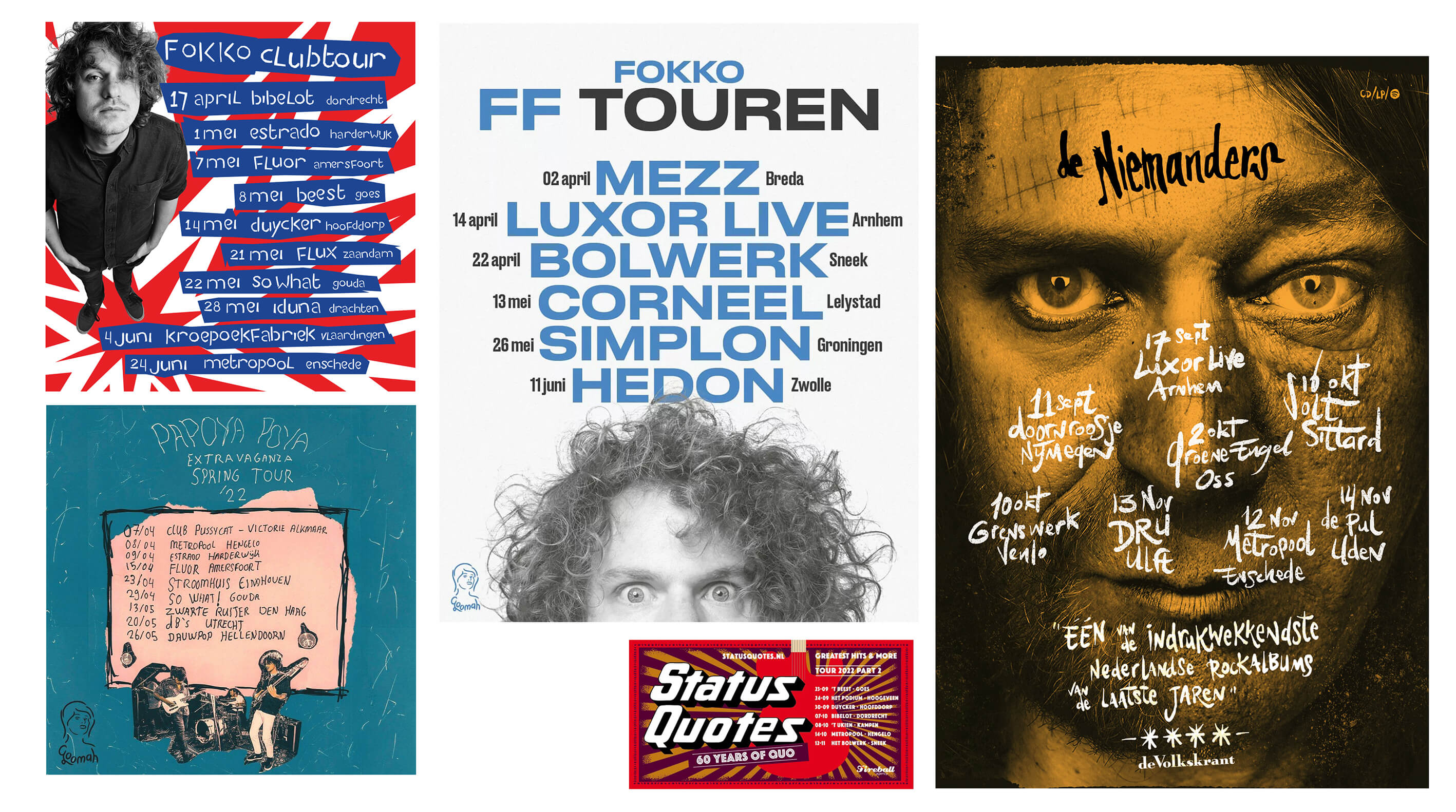Entrepreneur of the month: Tim Kampman
- Music
Academy of Pop Music, Enschede
Every month, the ArtEZ Business Centre and the courses together select a student or alumnus as Entrepreneur of the Month. Their stories give you an idea of what to expect, based on current topics from the professional field. Is there a secret to cultural success? Do you have to excel in your art or is it about selling yourself? Is it a matter of luck, wisdom, hard work or a good strategy?

I graduated in 2020 from the Academy of Pop Music in Enschede. I started as a guitar player, but then took a minor in Music Management. Now, I work as a booking agent at Goomah Music, do marketing for ArtEZ Conservatorium, and play in my band Tricklebolt. For most of the week, I work as an entrepreneur in the music industry.
When I started studying at ArtEZ in 2016, I was driven by my ambition to simply become a better guitar player, but I soon became interested in the Music Management course. When I decided to pursue a career in music after high school, I was already intrigued by the whole industry. Massive venues, major festivals, famous artists and powerful agents, and the teams who make it all happen behind the scenes: it had an exciting and mysterious quality to me. It seemed as if, with a little luck and the right network, anyone could have a breakthrough in this world. Success is always lurking around the corner, things could always get bigger, so you never know where your journey might take you.
Once I got to ArtEZ, I started taking any chance I got to be closer to the music industry. I tried to be present everywhere I could, to show my face and work hard whenever there was a job to do. It also became evident to my band that I liked to be the organisational force within the collective. I've questioned sometimes if I really wanted to go down this road. It felt peculiar to accept a laptop job instead of playing music all week. But the happening surrounding a show, a band, the build-up, the releases: that's what really excited me. Thinking in the service of a band and a show; and I just happen to also play the guitar for them.
From school to profession
Showing my face everywhere resulted in a chat with booking agent, programmer and label owner Frank Satink. Initially, he just gave our band some tips, but he later emailed me back: was I very busy, and if not, would I be interested in an internship at his label Goomah Music? It was the first career opportunity I got outside of ArtEZ, and that made me realize that I could really pursue a career for myself as a booking agent – and not just through my band. I've now been with Goomah Music for three years, have some 7 bands in my 'artist roster', and work there several days a week.

Networking
I owe a lot of my work to my network. I often attended showcase festivals, where people go specifically for networking purposes. That's taught me a lot, and I've only realized in the last few years how important it is to socialize and have a good time with others. In that sense, the term 'networking' can give you the wrong impression. Music professionals are people just like any other, and you should approach them just like you like to be approached. I also learned not to get too fixated on your visibility in the industry. Focus on yourself, try to work on awesome projects that you care about, and make a name for yourself by delivering quality. People know how to value that and they'll know how to find you.
I do a lot of different gigs side by side, which can sometimes get stressful and overwhelming. Still, the combination of being a booking agent and a musician is a nice one, a good balance. It also helps me professionally to meet people outside of the work environment. Just to talk about music, see a show, share your enthusiasm without needing something from each other. That might be what I enjoy most about the music world. The place where we work is also the place where, some other day, we go for pleasure. A place with a good, open vibe, where you can meet people in a low-key setting.
You'll also need to learn to sell yourself a little. That isn't always fun, but I think that clever strategies allow you to sell yourself and still be authentic, and that's a very healthy thing to learn.

The secret to success?
Authenticity and lots of practice. Don't focus too much on becoming successful. Focus on what YOU are good at and the things that make you unique. When your qualities and skills are developed enough and at a high-enough level, people will take notice. And of course, it helps to get lucky. But I think hard work, sometimes failing and learning from that, and keeping busy definitely help your chances of success. And when your 'stroke of luck' hits, you'll be ready for it. A lot of DIY experience and drive are, I think, what keeps you going long-term. You need to know why you do things and where your motivation comes from, so you can keep that fire burning.
You'll also need to learn to sell yourself a little. That isn't always fun, but I think that clever strategies allow you to sell yourself and still be authentic, and that's a very healthy thing to learn. I don't want to spend too much time doing 'sales', because I'm a 'maker' and that's why I got into this industry. If I get too invested in selling myself, I'll probably end up compromising my creativity, and that will hurt my #1 goal. But I am always aware of the things that I can do to sell myself and the different aspects to consider in the process. You'll very likely need to combine both your creative and your commercial skills to really make a living with your artistic talent.
I'm lucky enough to also find a source of fun and learning in 'selling myself'. You need to figure out what words and images you're going to use to sell yourself (or someone or something else). In your 'sales talk', you have to be able to zoom out, explain what qualities define you, and get the public to buy into that. You'll have to think deeply and objectively about yourself. You will probably learn things about yourself that you never realised.
Other than this 'mentality' behind success, you can also impress people with actions: be pro-active, be reliable, and be a pleasant person to work with.
Key moments
An important moment in my career path after ArtEZ was my choice to start a Master's programme. I gave up on it quickly, but it did teach me a lot. I simply took on too much by adding an MA to the mix, and began to lose control of all the other parts of my life. That made me reconsider what was really important to me: I want to deliver good work. And if you have too much going on, you end up working under a lot of stress and pressure, and you can no longer perform at the level you want to be known for. I decided to quit my MA and focus entirely on freelancing in booking, management, marketing, stand-in guitar player and panel member. Those were the things that energised me. It was an important lesson about following your passions, but also knowing your limits, and how to respect them for the best result.

Discovery
There's still a lot left to discover. Through which path or professional title, I'm not sure yet. On the one hand, I want to be a smart networker, with a lot of connections to solve practical problems and make successful bookings and PR campaigns. On the other hand, I am still very excited about "being an artist" and I like to think along with the content, DNA and vision of other artists. In my current position, I love all the opportunities I get to mix these two perspectives. For example, when I'm working as a booking agent for Goomah, I also like (and I think it's important!) to look at bands' press releases and online presence, even when that isn't really in my job description.
However busy or chaotic my week gets, something that always keeps me going is this: within the music industry, you're working on something that's larger than life. Whether it's a show or the growing success of a new artist, there is no ceiling, and you never know in advance how far you can take it. That's why, no matter how small or big my task in any project, I am always driven by a huge, almost mystical dream to keep doing this work. When you start to see progress, in the shape of bigger shows, tours and successes, reality starts to align with that dream, and it keeps me going. In those moments, this is truly the best job I can imagine.


